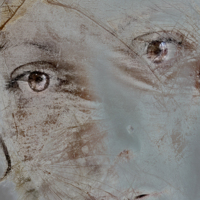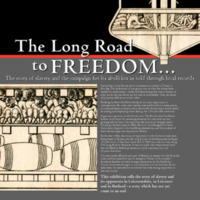
The Long Road to Freedom
As made clear by The Long Road to Freedom exhibition in 2007, the Record Office for Leicestershire, Leicester & Rutland contains a significant collection of documents which reveal local connections with the slave trade, and with those who campaigned for abolition. Several prominent local families owned slaves on plantations in the Caribbean and on the north coast of South America. Leading Leicester abolitionists, Elizabeth Heyrick and Susanna Watts, orchestrated a vigorous anti-slavery campaign in Leicester, including a boycott on sugar. Local landowner, Thomas Babington of Rothley Temple, was a friend of William Wilberforce and hosted meetings of anti-slavery campaigners at his home. The exhibition also highlighted a unique collection of mid-19th century papers which provide access to the voices of the enslaved in a slave court in Lagos, West Africa. It also told the stories of two former slaves, Rasselas Morjan and Edward Juba, who came to Leicestershire with their owners. This exhibition toured to various venues in the region, including Abbey Pumping Station, where it coincided with family activities focused on the work of Elizabeth Heyrick.
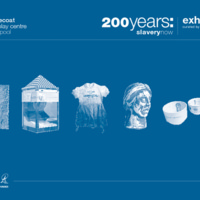
200 Years: Slavery Now
Bluecoat Display Centre is a contemporary craft and design gallery in Liverpool. The 200 Years: Slavery Now exhibition aimed to draw attention to modern slavery, both within the UK and in the wider international context. It brought together ten artists whose work reflected these concerns, and who were committed to highlighting the existence of slavery today through the creation of artefacts and the development of personal narratives. Materials used included ceramics, mixed media installations and textiles. Some of the themes covered included the exploitation of migrant workers, sex trafficking, 'sweat shop' mass production, and commemorating the Middle Passage and the workers of Manchester's cotton mills. The exhibition was curated by Professor Stephen Dixon, with the support of the Craft and Design Research Centre, MIRIAD, at Manchester Metropolitan University.
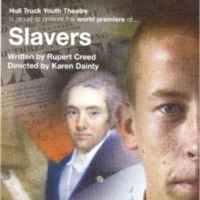
Slavers
Hull Truck Theatre supported Wilberforce 2007 with two specially commissioned productions, Slavers and Sold, and a playwright festival. For one week in August 2007, Hull Truck Youth Theatre presented Slavers, set in 2007, which told the story of abolition through the eyes of young people in Hull. Written by Rupert Creed and directed by Karen Dainty, the play followed a group of school leavers and their potentially prosperous business-start up, trading in human cargo. When some started questioning the morality behind the business, the audience was transported back to the debates of Wilberforce and his allies two hundred years previously. Another play, ‘Sold’, in conjunction with Liverpool Hope University, sought to raise awareness about the victims of human trafficking and sexual exploitation today.
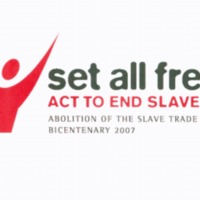
Set All Free: ACT TO END SLAVERY
Set All Free: ACT TO END SLAVERY was a project of Churches Together in England, based in London. It was also a collaboration between church-related groups, societies and organisations around the UK working together with a Christian ethos to assess the relevance of the bicentenary, and in particular the legacies of slavery. The project aimed to highlight how the values of the abolitionists can transform relationships on an individual, community and society level. The project included building a network coalition, campaigning, producing research and resources for churches, schools and individuals. Set All Free also worked closely with Anti-Slavery International and Rendezvous of Victory, a leading African community-led organisation.

Remembering Slavery Exhibition
Remembering Slavery 2007 involved museums, galleries and other cultural organisations across the North East of England in a programme of exhibitions, events, performances, lectures and activities to explore the themes of slavery and abolition, and identify connections with the region.
The Remembering Slavery exhibition focused on objects, paintings, documents and other historical material relating to the transatlantic slave trade and its legacy. The exhibition and associated programme of activities opened at the Discovery Museum in Newcastle and then toured to South Shields Museum and Art Gallery; Sunderland Museum and Winter Gardens; and the Laing Art Gallery. Whilst at the Discovery Museum, the historical exhibition was accompanied by a photographic exhibition, ‘Human Traffic’, produced by Anti-Slavery International, documenting the trafficking of children in Benin and Gabon in West Africa. Whilst at the Laing Art Gallery, the exhibition was shown alongside ‘La Bouche du Roi’ by Romauld Hazoumé, a contemporary installation based on the ‘Brookes’ slave ship.
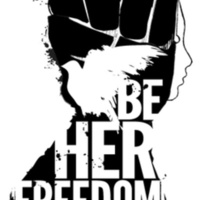
Be Her Freedom
The Be Her Freedom campaign is part pf the A21 movement which comprises of individuals, organizations, government officials, and members of the public who are committed to abolishing injustice in the 21st century. The image replaces the shackled pleading hands of past antislavery campaigns with a clenched fist - a symbol of self-determination and self-liberation.
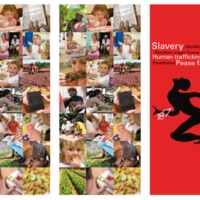
Slavery Here!
Slavery here! was a project hosted by museums across the Tees Valley led by Preston Hall Museum. It featured an interactive exhibition to explore the story of the Tees Valley’s connections with slavery. For example, the town of Stockton-on-Tees had its own Sugar House, a refinery that processed sugar from the Caribbean. The exhibition also looked at the work of local abolitionist campaigners Dr Robert Jackson and Elizabeth Pease, and the impact of contemporary slavery on today's society. Alongside the exhibition at Preston Hall Museum, other special events included workshops on African drumming and culture, object handling, and introductions to Fair Trade products. The project also produced a commemorative quilt (in collaboration with Newtown Community) and a film, ‘Manacles and Money’.
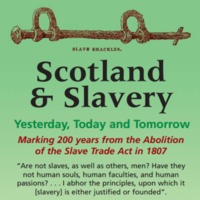
Scotland and Slavery
Action of Churches Together in Scotland (ACTS), which brings together nine Scottish denominations, marked the bicentenary with the Scottish Ecumenical Service to commemorate abolition held in the David Livingstone Centre in Blantyre in June 2007. The group also published a leaflet, ‘Slavery and Scotland’. On 25 March 2007, a commemoration walk was organised in partnership with the National Trust for Scotland. The walk started in Musselburgh and ended at the Gardens of Inveresk Lodge, once owned by James Wedderburn, who made his fortune as a slave owner in Jamaica. His son, the Jamaican-born Unitarian radical and anti-slavery advocate Robert Wedderburn, came to Musselburgh in 1795 to visit his father, but did not receive a good welcome.
ACTS also set up Freedom for All, a website project to mark the bicentenary. The website was intended to be a hub of resources and information on the impact of slavery, slave trade and abolition on Scotland.
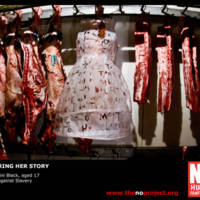
Wearing Her Story
In contrast to the trope that brands individuals’ experiences onto their backs, the No Project released a poster in 2012 titled “Wearing Her Story,” made by the artist Ismini Black. A woman’s dress hangs alongside carcasses in a butcher’s window. There are letters cut out of the dress and the words are impossible to piece together. By replacing a woman’s body with just her dress, the poster refuses to inscribe slavery’s story onto her flesh. She might wear her story like a removable item of clothing, but it is not the last word on her total identity. Instead it remains impossible to grasp and therefore consume, unlike the poster’s chunks of meat.
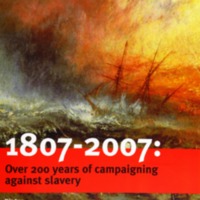
Anti-Slavery International, 2007
The world's oldest human rights organisation, Anti-Slavery International, led several initiatives in response to the bicentenary. The Fight for Freedom 1807-2007 Campaign, launched in 2005, called for measures to address the continuing legacies of the slave trade. The publication '1807-2007: Over 200 years of campaigning against slavery' looked back at the work of Anti-Slavery International and its predecessor organisations. The Spotlight on Slavery series of exhibitions and events included debates, lectures, film screenings and photography exhibitions. Anti-Slavery International also collaborated with a number of other organisations and projects in 2007, including Rendezvous of Victory and Set All Free, and contributed exhibition material to various exhibitions around the UK, including the Remembering Slavery exhibition at the Discovery Museum in Newcastle.
